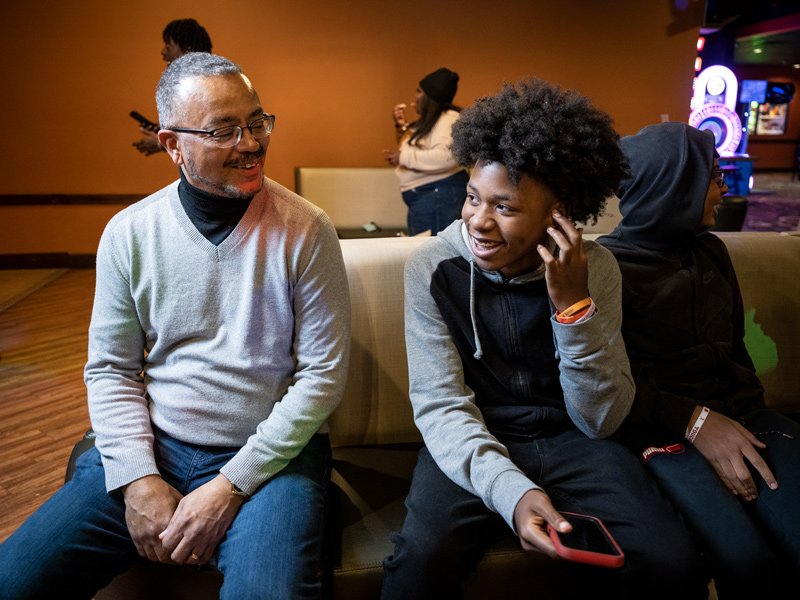A Working Alternative: How Cone Health Used a Donor Fund to Help the Greensboro Police Department Address Violent Crime Involving Teenagers

It was early March 2021 when Greensboro Police Chief Brian James sent an email to 25 local leaders: Come to the ACC Hall of Champions to learn about “a different type of community initiative to address violent crimes.”
If not for COVID-19 restrictions, James could have filled 2,500 seats that night, so great was the interest in curbing violence in our community. In 2020, the city logged a record 61 homicides, including seven shooting deaths in the first seven days of July. What’s worse, a dozen or more of the year’s homicides involved people under age 20, either as victims or alleged killers. For James, a longtime Greensboro cop who became chief in January 2020, it was the most sickening aspect of his bloody first year leading the department.
“If you’re 17 or 18 and you’re using a gun, just three or four years ago you were probably in middle school,” media outlets reported James saying at a news conference in November 2020, a departure from his typical stoic delivery. “How do you get from middle school to carrying a gun and willing to shoot people?”
Jay Wyatt, MD, Cone Health’s chief medical officer, often asked himself that question. Maybe a little too often. During his time as Cone Health’s chief trauma surgeon and the department’s director — 2000 to 2019 — the shooting victims he saw got younger and younger. By the end of his tenure, he and the other surgeons were operating on four or five teenagers a week. It took a toll on Dr. Wyatt emotionally. It also left him with existential questions he couldn’t answer.
“I was getting, I wouldn’t say clinically depressed, but I was thinking about this so much,” he says today. “I’m putting these kids back together and then they’re just getting replaced by another kid and another kid and another kid. We can say all we want to about drugs and gangs and other stuff. But all of these victims — they were just innocent kids at some point in their lives. They could have been involved in something bad, but they weren’t always involved in something bad.”
Though Dr. Wyatt was more than a year removed from his trauma department duties when James’ email arrived, he remained haunted by violence involving teenagers and decided to attend.
The same invitation had arrived in the inbox of Michelle Schneider, Cone Health’s vice president and chief philanthropy officer. But on that night, she was there not as a fundraiser, but as a Greensboro resident with a strong interest in her neighborhood’s crime prevention programs. Schneider grabbed a seat next to her friend and co-worker Dr. Wyatt — both eager to hear the chief’s plan.
As James began ticking off statistics about violent crime in the city, with particular emphasis on crimes involving teenagers, Dr. Wyatt leaned over and whispered to Schneider: “I’ve always wondered what the kids’ lives must be like who I see on my operating table. Because they just come back.” “I know,” she whispered back. “We can’t possibly understand what they have to deal with.”
James continued: Greensboro needs to provide its teenagers with something to do this summer. Not volunteering, he stressed. Jobs. Jobs that pay real money and inspire them to become productive citizens. Jobs that show them that the work they do matters. That they matter.
Then James made his announcement: “We’re going to find 500 jobs for kids in Greensboro this summer.”
Schneider, caught up in the excitement, turned to Dr. Wyatt and said, “Cone Health’s got to be a part of this.”
The “whats” and the “hows” and “how much” would come later. But on that night, Schneider and Dr. Wyatt left the ACC Hall of Champions feeling more hopeful than they had in years.
Mobilizing a Team
At Cone Health, team members got to work, drumming up interest in the community for the program and finding ways to provide summer jobs for 15 local teenagers. The Cone Health Career Development team then prepared prospective employers for interviews with interested teens before connecting them with their eager pool of candidates.
Some donors choose to give to Cone Health’s Area of Greatest Need fund, which gives the board discretion to use the money how it sees fit. The Cone Health board believed this program, now dubbed ConeCorps, supported the mission of serving the community, and thus funds were used to pay the kids’ salaries; provide transportation to and from their jobs; supply lunches, snacks and beverages at their worksites each day; and give each participant a backpack that they could use for school.
“Unlike a grant that we seek for a specific project, those dollars are there because people trust us to react to opportunity or need,” Schneider says today. “Having that money helped us realize that if money is not the obstacle, then we could make it happen.”
No, enthusiasm and money weren’t the obstacles. COVID-19 was the obstacle. Cone Health’s hospitals and health centers maintained strict protocols about letting in visitors and volunteers. Providing positions at Cone Health for teenagers — who at that point still weren’t eligible for vaccinations — was out of the question.
Schneider and her team now needed to find 15 jobs for high school-age kids in the middle of a pandemic.
Time was another obstacle. The warmer weather brought increasing pressure to find paying gigs for the 15 ConeCorps members. So she tapped out an email to a few of her nonprofit contacts that read a little something like this: “Guys, what if we have a work program for teenagers this summer? They’ll hold down jobs at your organization at no cost to you. Philanthropy will pay for everything, but you have to figure out the rest. Oh, and we have to be ready to go in six weeks.”
“Buck and Winston were the two who said, ‘Heck, yeah. We can make this happen,’” Schneider says.
“Buck” is Buck Cochran, who at the time was CEO of Peacehaven Community Farm, a sustainable farm in Whitsett that connects people with intellectual and developmental disabilities to their community. And “Winston” is Winston McGregor, president of the Guilford Education Alliance, a nonprofit that supports Guilford County Schools. The alliance maintains the Teacher Supply Warehouse, which provides high-demand classroom supplies that teachers would otherwise typically buy with their own money.
Fifteen ConeCorps participants would arrive at Peacehaven Farm and the Teacher Supply Warehouse in June — right when the two nonprofits begin their busiest seasons.
Things were coming together. The momentum led to an additional idea: “Those kids need someone to mentor them,” Dr. Wyatt told Schneider. “I want to find someone from Cone Health to be their champion.” He sent emails to the system’s top officials telling them about James’ call for 500 jobs, explaining the urgent need to help give teenagers something meaningful to do during the summer, and asking for their time and effort to support the program.
By the time ConeCorps began, each teen was paired with a senior-level leader, including Dr. Wyatt. The champions would keep in touch with them during the program, share some lunches and, according to Dr. Wyatt, “open up the world to them, show them what they can do based on the experiences of the people they’re meeting.
'A Breath of Life'
Around the end of June, ConeCorps participants reported to Peacehaven Farms and the Teachers Supply Warehouse. For many of them, it was their first real job. Market America heard about the program and provided all 15 participants with laptops — an unexpected bonus.
Cochran imagined the teens would be a big help with the day-to-day tasks of running a working farm — cleaning the barn, weeding, harvesting cucumbers and onions and squash. And they were. They worked their way across 89 acres, sometimes dodging rain by working inside to clean and box vegetables for the farm’s shareholders.
What he didn’t anticipate, however, was how much their energy and spirit would impact the organization at a time when COVID-19 had made the work much harder. None of them had ever been on a farm before, according to Cochran, which made the many questions they asked and the initiative they showed all the more special.
“It sounds hokey, but it was like a breath of life came back to the farm,” he says. “My great hope is that this is a program we can build on.”
Meanwhile, Dr. Wyatt was busy working as a champion to the student with whom he was paired — Antione Young, a 14-year-old with dreams of playing in the NFL. During a few dinners and trips to a bowling alley, always accompanied by Antione’s mother, Varanese Morris, Dr. Wyatt urged him to have a back-up plan. “In sports,” he told Antione, “you’re always one injury away from never having a career.”
When Morris mentioned that Antione was reluctant to get a COVID-19 vaccination, which had just become available for teenagers, Dr. Wyatt discretely dropped in a few mentions of the vaccine’s safety during their conversations, careful not to badger him.
Dr. Wyatt also knows the names of Antione’s friends, asks questions about his classes and offers subtle advice about the future.
“Dr. Wyatt has helped (Antione) see that he has greatness in him, and that he doesn’t have to be a follower,” Morris says. “I believe he has brought Antione some calm and helped him figure out who he’s supposed to be.”
This was what had been missing in previous programs, according to Dr. Wyatt. One-on-one mentoring, combined with the opportunity to do meaningful work for actual money.
“It was one of the first times I’ve felt like we were actually focusing on the right thing,” he says. “At a lot of the meetings we’d have before, we had great intentions. We had great people. But we stopped. We all suffered from the same thing — lack of focus on how to really have an effect.
“ConeCorps seemed to focus on having a positive effect.”
By summer’s end, the mood had brightened downtown at police headquarters, where officials tracked 525 teenagers with summer jobs. The chief is planning on repeating the request in 2022.
And so is Cone Health. ConeCorps came together in a mad rush and was still a resounding success. Just imagine what it could be with more planning.
“Philanthropy allowed it to happen,” Schneider says. “It wasn’t something that Cone Health could have easily done without those dollars.”
